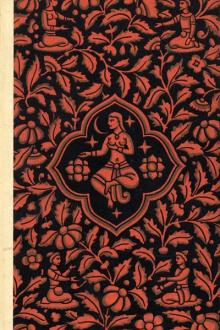Genre Fantasy. Page - 19

at my appearance did no discredit to Sullivan and the great lady, his wife.
At eight o'clock, when the conductor appeared at his desk to an accompaniment of applauding taps from the musicians, the house was nearly full. The four tiers sent forth a sparkle of diamonds, of silk, and of white arms and shoulders which rivalled the glitter of the vast crystal chandelier. The wide floor of serried stalls (those stalls of which one pair at least had gone for six pound ten) added their more sombre brilliance to the show, while far above, stretching away indefinitely to the very furthest roof, was the gallery (where but for Sullivan I should have been), a mass of black spotted with white faces.
Excitement was in the air: the expectation of seeing once again Rosetta Rosa, the girl with the golden throat, the mere girl who, two years ago, had in one brief month captured London, and who now, after a period of petulance, had decided to recapture London. On ordinary nights, for the inhabitants of boxes, the O

n creed he so specially condemned,--for each one wore on his breast a massive golden crucifix, hung to a chain and fastened with a jewelled star.
"Cross and Star!" he mused, as he noticed this brilliant and singular decoration, "an emblem of the fraternity, I suppose, meaning ... what? Salvation and Immortality? Alas, they are poor, witless builders on shifting sand if they place any hope or reliance on those two empty words, signifying nothing! Do they, can they honestly believe in God, I wonder? or are they only acting the usual worn-out comedy of a feigned faith?"
And he eyed them somewhat wistfully as their white apparelled figures went by--ten had already left the chapel. Two more passed, then other two, and last of all came one alone--one who walked slowly, with a dreamy, meditative air, as though he were deeply absorbed in thought. The light from the open door streamed fully upon him as he advanced--it was the monk who had recited the Seven Glorias. The stranger no sooner beheld him than

ess Sergeant at Sfax, with the 4th Spahis. I had a good record, and besides, as I did not drink, the Adjutant had assigned me to the officers' mess. It was a soft berth. The marketing, the accounts, recording the library books which were borrowed (there weren't many), and the key of the wine cupboard,--for with that you can't trust orderlies. The Colonel was young and dined at mess. One evening he came in late, looking perturbed, and, as soon as he was seated, called for silence:
"'Gentlemen,' he said, 'I have a communication to make to you, and I shall ask for your advice. Here is the question. Tomorrow morning the City of Naples lands at Sfax. Aboard her is Captain de Saint-Avit, recently assigned to Feriana, en route to his post.'
"The Colonel paused. 'Good,' thought I, 'tomorrow's menu is about to be considered.' For you know the custom, Lieutenant, which has existed ever since there have been any officers' clubs in Africa. When an officer is passing by, his comrades go to meet him

ttwelve paces distant; when, abruptly, the silent figure made three quickstrides to the port rail, and climbed over it into the sea.
I rushed to the side, and stared over; but nothing met my gaze, exceptthe shadow of the ship, sweeping over the moonlit sea.
How long I stared down blankly into the water, it would be impossible tosay; certainly for a good minute. I felt blank--just horribly blank. Itwas such a beastly confirmation of the unnaturalness of the thing Ihad concluded to be only a sort of brain fancy. I seemed, for thatlittle time, deprived, you know, of the power of coherent thought. Isuppose I was dazed--mentally stunned, in a way.
As I have said, a minute or so must have gone, while I had been staringinto the dark of the water under the ship's side. Then, I came suddenlyto my ordinary self. The Second Mate was singing out: "Lee fore brace."
I went to the braces, like a chap in a dream.
II
What Tammy the 'Prentice Saw
The next morning, in my w

he youth kissed the hand of his sire who said, "O my son, were I sure that thou wouldest deal justly by Anis al-Jalis, I would give her to thee." "O my father, what justice am I to do to her?" "I enjoin thee, O my son, not to take another wife or concubine to share with her, nor sell her." "O my father! I swear to thee that verily I will not do her injustice in either way." Having sworn to that effect Nur al-Din went in to the damsel and abode with her a whole year, whilst Allah Almighty caused the King to forget the matter of the maiden; and Al-Mu'ín, though the affair came to his ears, dared not divulge it by reason of the high favour in which his rival stood with the Sultan. At the end of the year Al-Fazl went one day to the public baths; and, as he came out whilst he was still sweating, the air struck him[FN20] and he caught a cold which turned to a fever; then he took to his bed. His malady gained ground and restlessness was longsome upon him and weakness bound him like a chain; so he called out,

the cargadores had taken along my orchids in their scurry.
"There was nothing to do but to make the best of it, and that meant getting under way. My rifles and ammunition were in the shelter, and one of the dogs had stayed behind. There was no use crossing the stream, for the opposing cliffs were sheer and apparently unscalable, though I thought I saw traces of a succession of rough steps that almost looked like masonry leading to a ledge halfway up the cliff. But there they ended definitely in a smooth wall. So I decided to follow the stream downward. It ran almost due northeast toward the Amazon, and I hoped that later it would widen and become navigable for a raft. Shorthanded as we were, that was a slim chance, but the only one in sight.
"It was useless to follow the carriers. The day was drawing to a close, and I determined to pass the night where we were. At sunset I heard a shout from the machete men, and found them groveling on the edge of the precipice. It was the mirage again, float

'But somebody knows that you are in the house?'
'No; nobody.'
'How do you get your dinner, then?'
'I keep poultry - of a sort.'
'Where do you keep them?'
'I will show you.'
'And who makes the chicken broth for you?'
'I never kill any of MY chickens.'
'Then I can't understand.'
'What did you have for breakfast this morning?' asked the lady.
'Oh! I had bread and milk, and an egg - I dare say you eat their eggs.'
'Yes, that's it. I eat their eggs.'
'Is that what makes your hair so white?'
'No, my dear. It's old age. I am very old.'
'I thought so. Are you fifty?'
'Yes - more than that.'
'Are you a hundred?'
'Yes - more than that. I am too old for you to guess. Come and see my chickens.'
Again she stopped her spinning. She rose, took the princess by the hand, led her out of the room, and opened the door opposite the stair. The princess expected to see a lot of hens and chickens,

easily expelled, and had dyed with blackness the walls towhich, bat-like, it had clung, these tapers served but ill tolight up the gloomy hangings, and seemed to throw yet darkershadows into the hollows of the deep-wrought cornice. All thefurther portions of the room lay shrouded in a mystery whosedeepest folds were gathered around the dark oak cabinet which Inow approached with a strange mingling of reverence andcuriosity. Perhaps, like a geologist, I was about to turn up tothe light some of the buried strata of the human world, with itsfossil remains charred by passion and petrified by tears.Perhaps I was to learn how my father, whose personal history wasunknown to me, had woven his web of story; how he had found theworld, and how the world had left him. Perhaps I was to findonly the records of lands and moneys, how gotten and how secured;coming down from strange men, and through troublous times, to me,who knew little or nothing of them all. To solve myspeculations, and to dispel the a

nstrument, and this must have been done while all in the castle slept. Glinda was shocked and grieved. Who could have done this wicked, bold thing? And who could wish to deprive her of her Great Book of Records?
The Sorceress was thoughtful for a time, considering the consequences of her loss. Then she went to her Room of Magic to prepare a charm that would tell her who had stolen the Record Book. But, when she unlocked her cupboards and threw open the doors, all of her magical instruments and rare chemical compounds had been removed from the shelves.
The Sorceress was now both angry and alarmed. She sat down in a chair and tried to think how this extraordinary robbery could have taken place. It was evident that the thief was some person of very great power, or the theft could never have been accomplished without her knowledge. But who, in all the Land of Oz, was powerful and skillful enough to do this awful thing? And who, having the power, could also have an object in defying the wisest and mo
